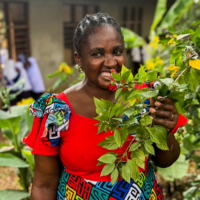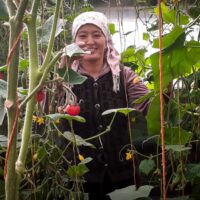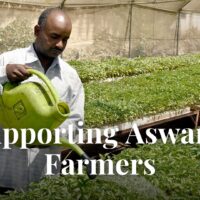At thirty-four years old, Hamza has lived in the Khatlon region in southwestern Tajikistan for his entire life. A farmer, Hamza started to grow potatoes for his living because the crop grows well in Khatlon’s climate and is a main ingredient in many Tajik dishes.
Even with his ten years of experience in farming, Hamza still faced challenges in producing high quality potatoes. “Access to high quality seeds and effective use of fertilizers were one of the main reasons that decreased my harvest potential and income,” Hamza says. “Our markets have only local seed potatoes available, which are of low quality. These seeds are susceptible to many diseases, which at the end of the day prevents us from receiving a large quality yield.”
Hamza worked hard and took care of his land in a way he thought was right to increase his yield, but despite that, only a small percentage of his potatoes were high quality enough to sell.
“I worked day and night on my land. However, the result I got every time was not what I was looking for. Large portion of the harvest, most of the time, was of low quality, and we were not able to neither eat it, nor sell it or use for the next crop,” Hamza said.
Even though Hamza had experience in farming, he needed support in advancing his skills and knowledge of good farming practices. At the same time, when the COVID-19 pandemic hit Tajikistan, Hamza and many others had a difficult time finding affordable food and farming supplies.
Finding a Solution
To address these challenges and support food security during the COVID-19 pandemic and beyond, Aga Khan Foundation (AKF) and the United States Agency for International Development’s (USAID) Local Impact project decided to take a long-term approach to the situation. Local communities are best positioned to both define their own challenges and develop their own solutions in response to those challenges.
In response to the challenge identified by farmers and as a result of direct feedback from farmers, AKF partnered with communities to establish Agriculture Inputs Revolving Funds (AIRFs) in Tajikistan’s Khatlon and Gorno-Badakhshan Autonomous Oblast (GBAO) regions. AIRFs are a pool of money that can be used by farmers to buy supplies like seeds and fertilizer, along with training on good farming practices. AIRFs were created in five villages in Khatlon, and are run by the already existing Village Organization’s agricultural committees.
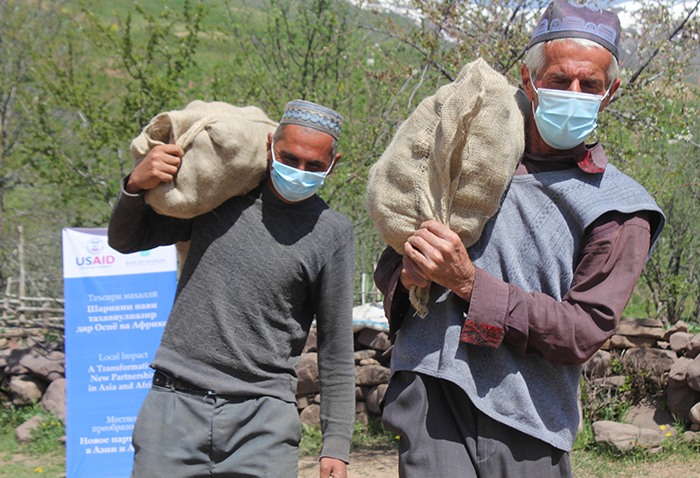
Local Impact is working with 224 members through the AIRFs to provide training for farmers, including Hamza. The farmers learn good farming practices, including how to select quality seeds, production practices, and postharvest handling and storage.
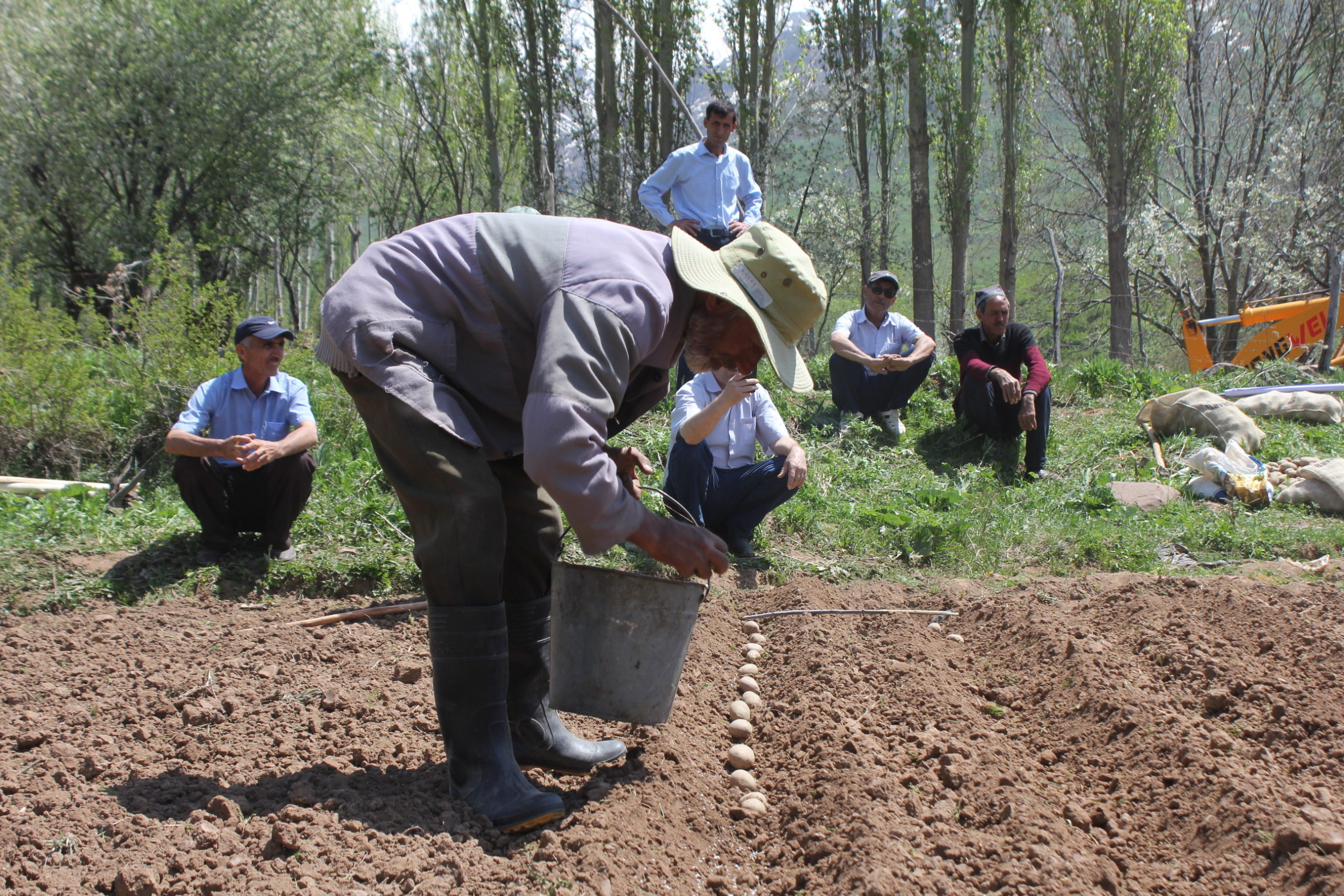
Improved Access to Potato Production and Productivity
Hamza was among the farmers who received high quality Bigrossa seed potatoes in 2021. The Bigrossa variety grows well in the region’s climate and land, is less susceptible to disease, and has a delicious taste with a proper amount of starch and sugar in them. Working together with local farmers, this unique variety was selected and procured for the AIRFs to manage.
“When I received the Bigrossa seed potato, I understood that now we will be able to improve the production and productivity and will benefit fully from our hard work,” Hamza said.
Hamza cultivated the 100 kilograms of seed potato he received on three acres of his land. “During the cultivation I had applied all the agronomic best practices which we have learned during trainings. I realized the importance of taking a different and more improved approach to sustainable production of clean and healthy seed potato and table potato.”
When the time came to collect the harvest, Hamza was thrilled.
“Out of 100kg, myself and my land were able to produce 900kg high quality potato,” he shared. “We have stored 150kg of seed potato for the next crop season, sold 300kg and received a good income, and now using the 330kg as food for my family. To continue the AIRF and support other local farmers I returned 120kg seed potato to the AIRF.”
The large initial yield enables Hamza to cultivate 150kg of seed potato on his five acres of land next year. This will allow Hamza to increase his production and food supplies in his region during a time of food shortages because of the COVID-19 pandemic.
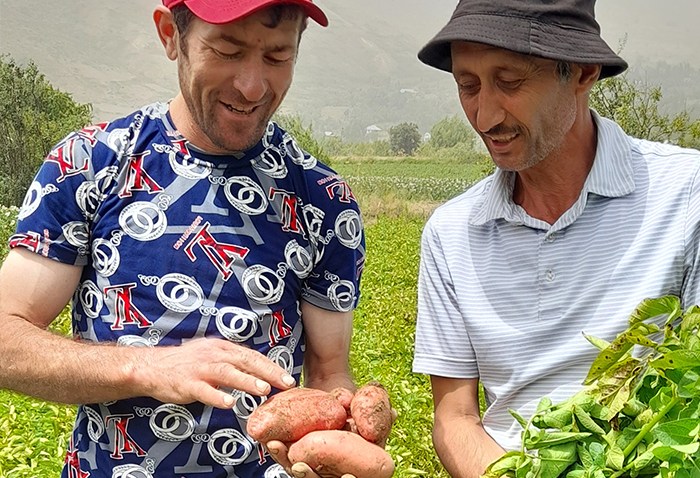
“Now I am certain that even if there will be food shortages or food price go up any time, we will have potato available for family consumption, storing crop for next season, and income-generating sales.”
Like Hamza, other members of AIRFs are also benefitting from this initiative. The 43,600 kilograms of Bigrossa seed potatoes distributed to AIRFs in the Dogiston, Shurobod, and Hazrati Emom villages in Khatlon yielded 250,700 kilograms of potatoes when the harvest was collected. Part of the seed potato will be stored by AIRFs for the next year, which will ensure that the production of high-quality potatoes continues. By following crop rotation guidelines and effectively using minerals and fertilizers, Hamza was able to cultivate a higher yield than most. During the next planting seasons, Hamza will share lessons with other farmers in the AIRF.
As the farmers improve their livelihoods by increasing yields and advancing production practices, they are helping to strengthen agribusinesses in Khatlon and increase food access to their community members.
z z z

